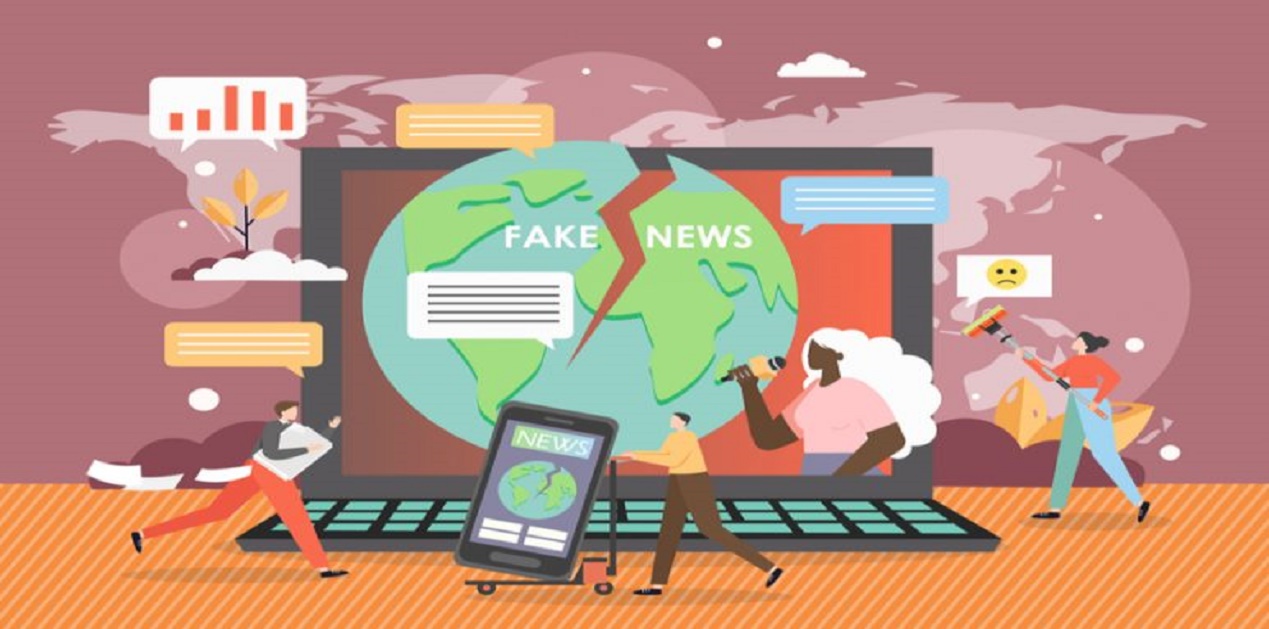Introduction
The emergence of social media has challenged modern democracies on multiple fronts-be it enticing violence or communal hatred or concerns of privacy and fake news, making it a new playground of battle. Platforms like Facebook and Twitter have long contributed to the democratisation of voices across the world. Unfortunately, the parallel forces of capitalism and information colonisation have wrought national security and the rule of law in democracies. While American tech giants advocate for freedom of speech and expression, questions have been raised over the unprecedented power of social media to rewrite the principles of democracy. The traditional sources of media such as newspapers and radio facilitated civil discourse as journalism was unbiased. These days’ mainstream media is driven by the narratives floating on social media. The advent of social media has undermined democracies: the essential component of any democracy, an informed citizen stands at the crossroads of national security issues and concerns over profit. This article argues how social media complements the broader capitalistic paradigm of demand and supply by threatening the security and stability of the country.
The Business Model of Social Media
On a fundamental level, social media has eroded mainstream media and fostered a culture of speedy and commercialised news. The centrality of the business model of social media revolves around one concept: social media companies are the platforms and not the creators of content or information. In an article, Sarah Oats explains, "Section 230 of the U.S. Communication Decency Act states1, "no provider or user of an interactive computer service shall be treated as the publisher or speaker of any information provided by another information content provider."2 The U.S. Communication Decency Act has allowed the tech giants to get away with allegations of disinformation, the spread of fake news or hacking elections. Additionally, the platforms like Facebook, Twitter or Instagram have become the nervous system of the modern business world. Peter Singer and Emerson Brooking, the authors of Like War: The Weaponisation of Social Media, in an interview with Wharton, explained that "The social media are where we do business. They are where we set updates. Nevertheless, they have also become this space of battle, and the battle over everything from political campaigns to use in military operations, marketing wars3; name it."4
In a webinar hosted by Vivekananda International Foundation, Devsena Mishra explained the relationship between consumers and producers of content on social media. She suggested that social media companies invest billions of dollars in R&D in understanding human psychology.5 A recent Netflix documentary, 'The Social Dilemma," depicts how personalised algorithms dictate and control what the users see on social media platforms. As a result, it makes the users' predictable', lacking nuance, to benefit the few. The social media platforms generate revenue from users' clicks by showing them content they wish to see and believe.
There has been an unprecedented rise in social media influencers6, Facebook, Twitter, Instagram or YouTube. As the content created and consumed on social media platforms is diverse, ranging from home to opinions on laws and policies, the users get paid for having a large following. The same influencers for increasing likes and followers can comment on law and order and national security matters without responsibility. The blue ticks on Instagram and Twitter and honour badges on YouTube have become symbols of eminence and status that state and non-state actors such as terrorist organisations and the adversary nations can weaponise.
How Social Media threatens National Security?
Social media companies have been unable to balance the national security concerns with the capitalist motivations of profit. As social media competes for the attention of the masses, it becomes a tool of information warfare and propaganda. While social media gives voice to the voiceless, it is also used to polarise society. In an interview with Tom Hodgkinson, Jaron Lanier author of "10 Arguments For Deleting Your Social Media Accounts Right Now", argues how "free will has to involve some degree of creativity and unpredictability of how a person responds to the world around".7 Additionally, a person's views are subject to change and growth depending on the things they might discover. Social media algorithms inhibit this growth by minimising exposure to opposing views as that would not generate their revenue. This use of algorithms results in a very critical negative externality that the modern state faces: growing intolerance amongst people towards contesting ideas and promoting violence rather than constructive dialogue around a topic. The attention-driven social media model may also make a country vulnerable to separatist groups who can mobilise large crowds by spreading false information at lightning speed.
In a democracy as vibrant as India, social media platforms have been successfully used by external foes and internal separatist and extremist groups to assault the Indian civilisational values of tolerance and Vasudhaiva Kutumbakam. Social media platforms like Twitter, Facebook and Youtube have8 been used for information warfare against India and the government in power. The external adversaries like China and Pakistan have pushed anti-Indian narratives on social media and tried to undermine Indian soldiers' morale during the recent border conflict with China. According to an article published on scroll.In Chinese Twitter warriors used memes to mock the capability of the Indian Air Force to launch an attack on China. 9 In addition to that, social media platforms have been used by Pakistan to accuse India of human rights violations in Kashmir falsely. In an article published by the Indian Express , Tilak Devasher explains, "The core Pakistani objective is to demolish "Brand India" by attacking its key components — an inclusive and secular society, democratic polity, decisive government, a developing economic powerhouse and strong foreign policy".10
Not long ago, security agencies of India had identified nearly 1200 Twitter accounts linked to Khalistan sympathisers or backed by Pakistan concerning the farmer's protests. Many of these accounts were automated bots used to share and amplify misinformation and provocative content on farmers' protests, reported Firstpost.11 Hashtags and handles that suggested farmers’ genocide were planned to incite criminal violence and impact public order. However, Twitter had blocked those accounts under directives from the IT Ministry but unilaterally decided to unblock them after a few hours. Additionally, twitter's CEO Jack Dorsey's liking of tweets made by foreign celebrities in support of farmers' protest raises questions about the neutrality of these platforms and their power to rise above the law of the land.
A Way Forward
As social media companies and AI become increasingly advanced and powerful, it is pertinent to introduce regulations and taxations on social media. As a short term measure, the lawmakers should focus on how IT laws can minimise threats to national security, including theft of data and society's polarisation. To reduce the risk of radicalisation, the IT community should advocate for contracts between employers and employees on YouTube and Instagram so different interest groups do not use them. Additionally, there is a heightened need for digital literacy, especially amongst the growing youth population. India accounts for the largest youth population globally; hence it is imperative to establish checks and balances. The policymakers should aim to democratise free speech and protect the users from groups having vested interests to mobilise innocent people. The innovation and development of new social media platforms will allow India to have global appeal in the long run.
References
- Efforts underway to rein in internet disinformation. (2021, February 11). The Boston Banner, 56(29), 4.
- Oates, S. (2020, May 11). The easy weaponization of social media: why profit has trumped security for U.S. companies. NCBI. https://www.ncbi.nlm.nih.gov/pmc/articles/PMC7212244/
- Why Social Media Is the New Weapon in Modern Warfare .... https://knowledge.wharton.upenn.edu/article/singer-weaponization-social-media/
- [email protected]. (2019, January 17). Why Social Media Is the New Weapon in Modern Warfare. Knowledge@Wharton. https://knowledge.wharton.upenn.edu/article/singer-weaponization-social-media/
- Devsena Mishra (2021, February 27), National Security Workshop. https://www.youtube.com/watch?v=DXcJhJMceNw
- 30 Call Center Statistics and 10 Metrics to Track in 2021. https://biz30.timedoctor.com/call-center-statistics/
- Hodgkinson, T. (2018, September 3). SOCIAL MEDIA IS DESTROYING YOUR FREE WILL. Idler. http://web.archive.org/web/20200928135946/https://www.idler.co.uk/article/social-media-is-destroying-your-free-will/
- Ranjan, R. (2020, January 23). In the social media battle against India, Chinese users deploy memes from the Pakistani Twitterverse. Scroll.In. https://scroll.in/article/965378/in-social-media-battle-against-india-chinese-users-borrow-memes-from-pakistani-twitterverse
- Devasher, T. (2020, July 27). Pakistan’s information war campaign against India needs attention. The Indian Express. https://indianexpress.com/article/opinion/columns/india-pakistan-information-war-campaign-6524734/
- Of India, P. T. (2021, February 8). Farmers’ Protest: Centre orders Twitter to block 1,178 accounts for “spreading misinformation.” FirstPost. https://www.firstpost.com/india/farmers-protest-centre-orders-twitter-to-block-1178-accounts-for-spreading-misinformation-9281801.html
- How will the ban affect brands/influencers that use Social .... https://www.medianews4u.com/how-will-the-ban-affect-brands-influencers-that-use-social-media-for-marketing/
(The paper is the author’s individual scholastic articulation. The author certifies that the article/paper is original in content, unpublished and it has not been submitted for publication/web upload elsewhere, and that the facts and figures quoted are duly referenced, as needed, and are believed to be correct). (The paper does not necessarily represent the organisational stance... More >>
Image Source: https://www.media-diversity.org/wp-content/uploads/2020/12/shutterstock_1780467770-773x517.jpg











Post new comment